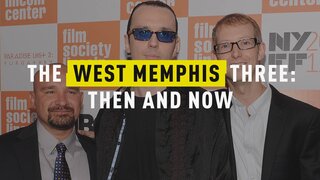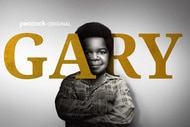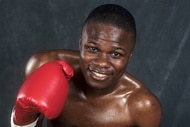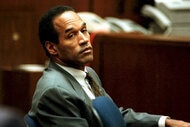Create a free profile to get unlimited access to exclusive videos, breaking news, sweepstakes, and more!
Which Celebrities Advocated For The Release Of The West Memphis Three?
Celebrities like Johnny Depp, Peter Jackson, Eddie Vedder and Natalie Maines used their status and income to help free the West Memphis Three in 2011.

After the gruesome murders of three 8-year-old Cub Scouts in 1993, a small town in Arkansas was quick to accuse three outcast teenagers.
Dubbed the "West Memphis Three," Damien Echols, 18, Jason Baldwin, 16, and Jessie Misskelley, 17, were arrested and ultimately convicted in the deaths of Stevie Branch, Christopher Byers and Michael Moore.
Due to Echols’ preference for black clothing and heavy metal music, many fervently believed the teen was the leader of a Satanic cult that killed the three young boys in a ritual.
Law enforcement was also confident they had the right suspects after Misskelley confessed to helping Echols and Baldwin carry out the murders, which he later recanted.
But, the seemingly clear-cut guilty verdict for the West Memphis Three that saw Echols sentenced to death and Baldwin and Misskelley to life imprisonment changed after the 1996 release of "Paradise Lost: The Child Murders at Robin Hood Hills." It was the first of a trilogy of HBO documentaries that cast doubt on the investigation and trials.
As a result of "Paradise Lost," some of Hollywood's most elite performers of stage and screen were so enthralled by the case that they took up a cause that helped free the West Memphis Three.
Some like punk rock musician Henry Rollins saw their younger selves in the trio. “I’d find myself up at 3:30 a.m. thinking about Damien. He could have been me," Rollins told Rolling Stone in 2011. "I had those records. I was sullen as a teenager.”
Rollins organized benefit shows to support the West Memphis Three, and in 2002, he released the album "Rise Above: 24 Black Flag Songs to Benefit the West Memphis Three," with sales going toward their legal funds. The album featured various rock, hip hop, punk and metal musicians, including Iggy Pop and Ice T.
By 2005, Rollins had raised $100,000 for the West Memphis legal team. The donations were crucial in funding a new batch of DNA testing on crime scene evidence, as the state of Arkansas had refused to pay for it, Rollins reported in a 2011 LA Weekly article.
When additional DNA testing was done in 2007, it showed that no genetic material from the crime scene evidence was a match to Echols, Baldwin or Misskelley, according to court documents obtained by Oxygen.com.
The West Memphis Three were later able to enter an Alford plea, which allowed them to proclaim their innocence while admitting the prosecution had enough evidence to convict them, and they were released from prison in 2011.
In a 2012 E! News report, Echols cited Rollins as a vital force in the media that helped change his life. "Henry Rollins went on a tour just to raise the money to do the first round of DNA testing ... If the media doesn't care, if the world doesn't care, if people don't look at it, they'll still kill you and sweep it under the rug no matter how much evidence there is," he said.
Pearl Jam frontman Eddie Vedder also advocated for the men's release. He and the band Supersuckers released the single "Poor Girl" in 2000 on another benefit CD, "Free the West Memphis Three."
In July 2005, he donated signed music memorabilia to be auctioned for the "West Memphis Three World Awareness Day," according to The Hollywood Reporter. Vedder even appeared at court on the trio’s release date in August 2011. He sat with Echol's wife, Lorri Davis, in the front row and put his arm around her, CBS reported.
Natalie Maines of the Dixie Chicks was adamant that Echols, Baldwin and Misskelley were innocent. Upon the release of DNA evidence from the crime scene, Maines posted to the Dixie Chicks' official website claiming that the boys were innocent.
"I am confident that you will see the DNA evidence is irrefutable and that these three men did not get the kind of trial that is promised to us — as Americans," she wrote according to CBS.
Maines also alleged there was “new information implicating Terry Hobbs,” Branch’s stepfather, according to court documents obtained by Oxygen.com.
Hobbs vehemently denied the allegations and sued Maines for defamation. The lawsuit asserted that Maines' words were "so extreme in degree as to be beyond the pale of decency and to be regarded as atrocious and utterly intolerable in civilized society," Today reported.
She won the suit in April 2010. The judge ruled that Hobbs could not establish “actual malice,” according to the Associated Press.
In the aftermath, Hobbs was ordered to pay Maines' legal fees, which totaled $17,590, CBS reported. Police have never named him a suspect or charged him in connection with the case.
Maines was also in the courtroom when the West Memphis Three were freed in 2011, according to MTV.
"The gag order has been lifted, so now I can tell you, I'm sitting in a holding room at the courthouse about to see three men walk free!" Maines tweeted. "Beautiful things went down in Arkansas today. Beautiful beautiful things ... The WM3 will now and forever be the WMFree!"
Actor Johnny Depp was particularly influential in the "Free the West Memphis 3" movement. In a 2010 “48 Hours" interview, he adamantly proclaimed their innocence: “There's nothing from the crime scene that links Damien or Jason or Jessie to these crimes. There's not a shred of evidence, nothing there, there's no physical evidence.”
That summer, he publicly read excerpts from Echols' prison journals while at the Voices for Justice rally for the West Memphis Three. Depp read through a passage Echols' wrote about his experiences being shackled and unable to walk properly, The Arkansas Times reported. Vedder and Maines also performed at that event.
Echols considered Depp to be like family. "He's been with us every single step of the way," he told the Associated Press in 2012. "Since we've gotten out, he's become like a brother to me."
In fact, the two became so close that they got matching tattoos that Echols designed. "It's one of my all-time favorites, and it means quite a lot to me," Depp told the Associated Press in the same interview.
Comedian Margaret Cho also was an outspoken supporter of the West Memphis Three. In 2004, she wrote a lengthy entry on her website supporting Echols, Baldwin and Miskelley and encouraged prison reform. She became close with Echols through their prison visits, and wrote the forward to his autobiography, "Almost Home: The Life Story Vol. 1," published in 2005.
"Johnny, Henry Rollins, Margaret Cho, so many people formed a chain and if one single link in that chain was gone, they would have killed me," Echols noted in his 2012 E! News interview.
Actress Winona Rider joined the crusade to free the West Memphis Three. In 2003, she appeared at the "Cruel and Unusual: An Exhibition to Benefit the West Memphis Three" art show and spoke about the cause.
“We believe a terrible injustice happened 10 years ago,” she said, according to The Arkansas Times. “An injustice that involved six young lives. Three are dead. Three are holed up in prison for crimes that we and millions across America believe they did not commit.”
According the gallery, more than $20,000 was raised in donations and art sales for the legal team.
Additionally, "The Lord of The Rings" film series director Peter Jackson was a key social and economic figure in the defense investigations. Beginning in 2004, he and his partner Fran Walsh helped pay out of pocket for various investigation efforts for the three's defense. Among the services he expensed were forensic analysis expertise and tracking down witnesses, according to CBS.
"As we became more familiar with this case, we began to understand there was a powerful will to see three innocent young men die in prison, thereby compounding what was already a terrible tragedy," Jackson said in a Free West Memphis 3 statement to The Hollywood Reporter. "We felt any support we could lend, to stop this from happening, was worth our best efforts and there are many, many others who have done the same."
In 2012, Jackson and Echols produced "West of Memphis," a New Zealand true crime documentary about the case. Depp also endorsed the project. Similarly to "Paradise Lost," the film explored the events of the West Memphis Three and chronicled their imprisonment and ultimate release. It included interviews with lawyers, judges, family members, journalists and the West Memphis Three themselves. It was even nominated for Best Documentary Screenplay from the Writers Guild of America.
"For Peter, it's more the fact that Peter hates bullies," Echols told Katie Couric in 2014. "He can't stand bullies. And he saw someone with no ability to defend themselves being picked on by the state, and he wanted to even the playing field."
To learn more, watch “The Forgotten West Memphis Three” on Saturday, March 28 at 8/7c on Oxygen.



































